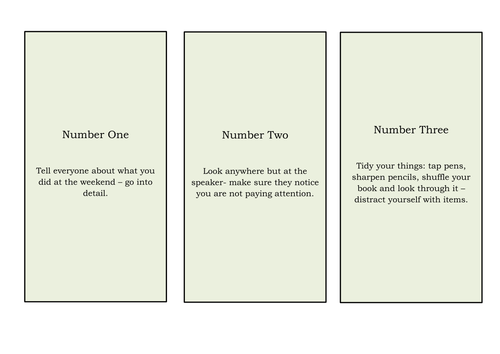

This is an hour-long lesson which has been the most effective lesson I have taught on the importance of listening skills and respect for each other.
Every time I have ran this lesson, either at the beginning as an introduction or during the term, I have seen a marked improvement in listening skills and behaviour. This lesson introduces the importance of listening and understanding others; it does it through hands-on, practical group work. This comes in the form of a series of speaking and listening exercises, each introducing the students to common problems teachers find.
- Exercise One: playing with pens, no eye contact.
- Exercise Two: no reaction.
- Exercise Three: losing attention, short attention spans.
- Exercise Four: talking over each other.
I always encourage the students to vocalise their thoughts and feelings after they have done each exercise; by experiencing what we deal with, albeit small-scale, it makes them much more receptive to being told to be quiet or that their behaviour is not respectful. It is also a lot of fun!
I usually time each exercise, aiming for about 2 minutes on each, but with some the students may run out of things to say very quickly. It is important that they only see their numbered cards (rather than the whole set) as the whole exercise is set on them not knowing what everyone else has.
I have included both the PowerPoint and the cards used - I usually print off the cards and have a set per group of three in an envelope.
The final part of the lesson is to get them to vocalise why your subject is valuable. Getting them to decide why they should study your subject gets them engaged really quickly. In terms of getting them to also tell you what they like doing and what they don't like really gives you a feel for the group as a whole.
Every time I have ran this lesson, either at the beginning as an introduction or during the term, I have seen a marked improvement in listening skills and behaviour. This lesson introduces the importance of listening and understanding others; it does it through hands-on, practical group work. This comes in the form of a series of speaking and listening exercises, each introducing the students to common problems teachers find.
- Exercise One: playing with pens, no eye contact.
- Exercise Two: no reaction.
- Exercise Three: losing attention, short attention spans.
- Exercise Four: talking over each other.
I always encourage the students to vocalise their thoughts and feelings after they have done each exercise; by experiencing what we deal with, albeit small-scale, it makes them much more receptive to being told to be quiet or that their behaviour is not respectful. It is also a lot of fun!
I usually time each exercise, aiming for about 2 minutes on each, but with some the students may run out of things to say very quickly. It is important that they only see their numbered cards (rather than the whole set) as the whole exercise is set on them not knowing what everyone else has.
I have included both the PowerPoint and the cards used - I usually print off the cards and have a set per group of three in an envelope.
The final part of the lesson is to get them to vocalise why your subject is valuable. Getting them to decide why they should study your subject gets them engaged really quickly. In terms of getting them to also tell you what they like doing and what they don't like really gives you a feel for the group as a whole.
Something went wrong, please try again later.
This resource hasn't been reviewed yet
To ensure quality for our reviews, only customers who have purchased this resource can review it
Report this resourceto let us know if it violates our terms and conditions.
Our customer service team will review your report and will be in touch.
£3.00
